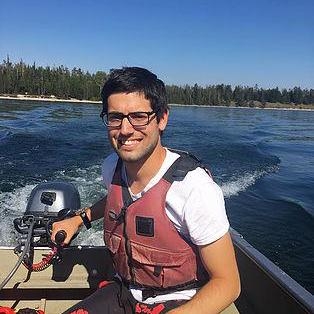The Richard Nelson Thomas Award was established by the friends and family of R.N. "Dick" Thomas to provide an annual award to the year's most outstanding graduate student in astrophysics. Each year, the JILA astrophysical faculty nominates outstanding students and vote to determine the recipient of the award.
This year two graduate students have won the award:
Loren Matilsky
Loren is majoring in global-scale simulations studying highly nonlinear stellar and solar convection and dynamo processes, and has published three papers in The Astrophysical Journal this year and last. He published another paper on Rossby vortices in accretion disks in Monthly Notices of the Royal Astronomical Society (MNRAS), along with a number of conference proceedings. His work has revealed how strong wreaths of magnetism can be build within turbulent convection zones that go through complex cycling, and has tackled the subtleties of achieving differential rotations profiles that capture the spirit of helioseismic findings.
He works under Fellow Juri Toomre and Senior Research Associate Brad Hindman. In announcing the award to JILA, Toomre said, “Loren is highly motivated and very effective in such research in astrophysical fluid dynamics. He is also a decidedly graceful and friendly young colleague, and keenly involved in helping to consider diversity issues.
Loren will be defending his thesis in the spring or early summer.
Heather Wernke
Heather plans to defend her thesis in 2021 on the dynamics of stars in eccentric disks around massive black holes. Her research involves "observing" simulations of such systems with a view to comparing them directly to observations of local galactic nuclei. She has uncovered interesting results particularly with respect to the location of compact objects (i.e. stellar mass black holes, etc.) in these systems.
Fellow Ann-Marie Madigan said, "I am very happy to nominate Heather for this award. She is a wonderful teacher and is looking forward to continuing teaching physics and astronomy past graduation."
Congratulations Loren and Heather!




 The Physics Frontiers Centers (PFC) program supports university-based centers and institutes where the collective efforts of a larger group of individuals can enable transformational advances in the most promising research areas. The program is designed to foster major breakthroughs at the intellectual frontiers of physics by providing needed resources such as combinations of talents, skills, disciplines, and/or specialized infrastructure, not usually available to individual investigators or small groups, in an environment in which the collective efforts of the larger group can be shown to be seminal to promoting significant progress in the science and the education of students. PFCs also include creative, substantive activities aimed at enhancing education, broadening participation of traditionally underrepresented groups, and outreach to the scientific community and general public.
The Physics Frontiers Centers (PFC) program supports university-based centers and institutes where the collective efforts of a larger group of individuals can enable transformational advances in the most promising research areas. The program is designed to foster major breakthroughs at the intellectual frontiers of physics by providing needed resources such as combinations of talents, skills, disciplines, and/or specialized infrastructure, not usually available to individual investigators or small groups, in an environment in which the collective efforts of the larger group can be shown to be seminal to promoting significant progress in the science and the education of students. PFCs also include creative, substantive activities aimed at enhancing education, broadening participation of traditionally underrepresented groups, and outreach to the scientific community and general public.